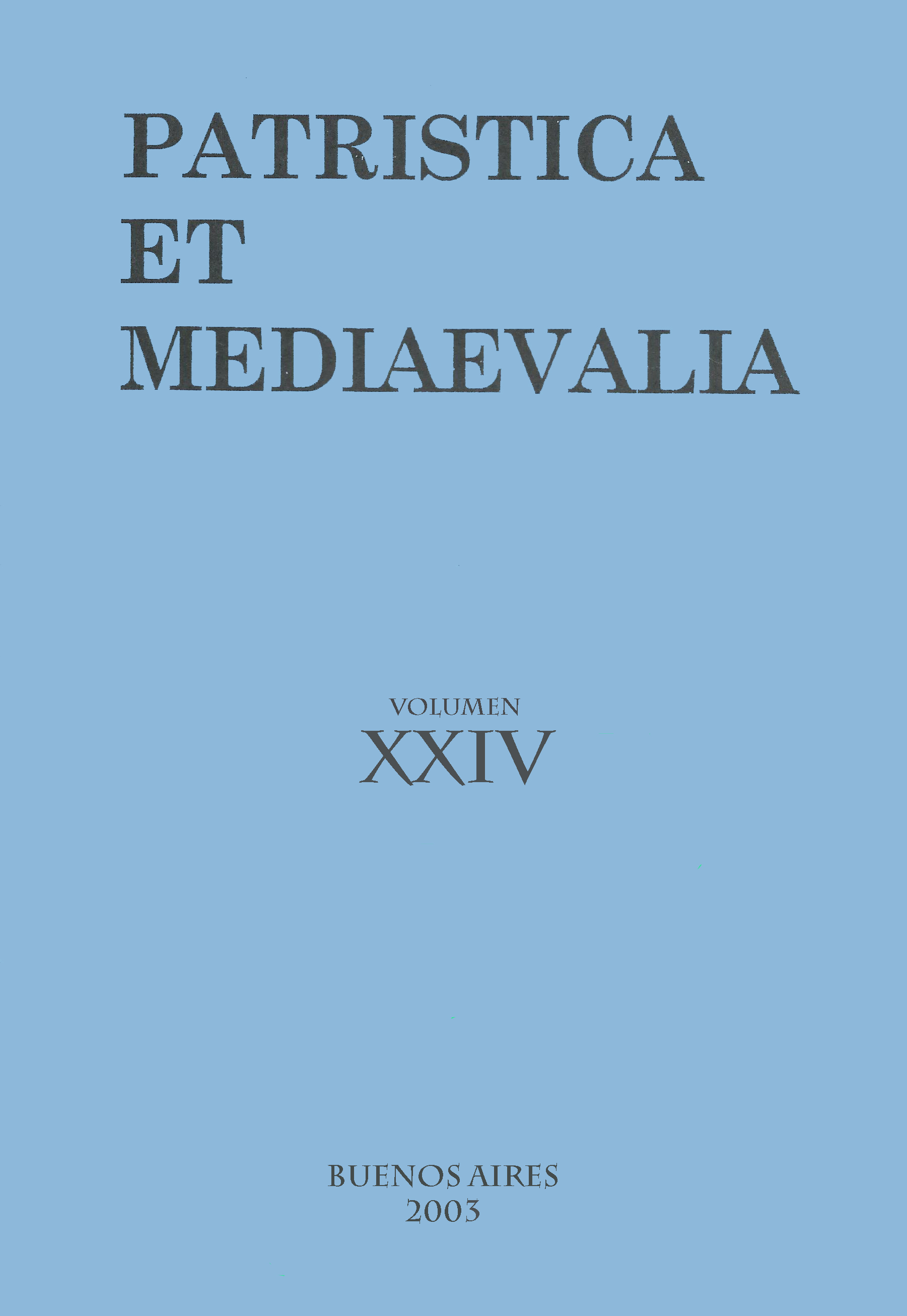Political Philosophy in the De Regno of Thomas Aquinas
Abstract
My essay on the political ideas in Thomas Aquinas’s DR deals with the main topics of political Philosophy Aquinas has established according to Aristotle’s Politics as well as to some Platonian doctrines, for example the doctrine that plurality presupposes unity (Proklos: Elementatio theologica, 5 Prop.) or the doctrine enunciated in the 16 Prop. of the Liber de causis: “A unified power is more effective in producing the bonum commune than a diffused or divided power”. Aquinas quotes this doctrine in DR I 3 and he contrasts it with his own opinions as being predicated on the Politics of Aristotle: (1) Bonum commune est melius quam bonum unius. (2) Human being is by nature an animal civile, nevertheless a state or city is due to a founder (Aristotle). (3) The polis or state are by their nature a plurality and diversity of human beings; a state becoming more and more a unity is, in the end, no longer a state, polis, or city (Aristotle). (4) Therefore, it is required for human beings to be governed and directed to the bonum commune or multitudinis as Thomas says, that is the task of the monarch, whereas the pope has to care for the final end of human life. (5) Aquinas’s doctrine of the duplex felicitas leads him to a strict disjunction between the two visible and perceptible powers of the world: the monarchical and papal. (6) Thus, there is no subjugation of the monarch under the pope. On the contrary, the monarch has to do deal with temporal things: the bonum commune, the welfare, and peace of a community; and the pope has to deal with the final and eternal good consisting in the visio Dei. Both, the secular and the spiritual powers are required to attain the happiness promised to us in the end of our life. (7) Finally, all human activities concerning the political organizations of human life are in the competence of free human creative power.Downloads
References
Bien, G. (1980). Die Grundlegung der politischen Philosophie bei Aristoteles. Freiburg/München: Alber.
Eschmann, I. Th. (1958). St. Thomas Aquinas on the Two Powers. Mediaeval Studies, 20, 177-205.
Eschmann, I. Th. (1982). St. Thomas Aquinas, On Kingship, To the King of Cyprus, trans. by G. B. Phelan, rev. with Introduction and Notes I. Th. Eschmann, O.P. Nevada: Academische Pers. (First edition: 1949).
Eschmann, I. Th. (1961). A Catalogue of St. Thomas’s Works. In Gilson, É. The Christian Philosophy of St. Thomas Aquinas. London: Victor Gollancz Ltd., 412-415.
Fidora, A. & Niederberger, A. (2001). Von Bagdad nach Toledo: Das Buch der Ursachen und seine Rezeption im Mittelalter, latenisch-deustcher Text, Kommentar und Wirkungsgeschichte des Liber de Causis. Mainz: Dieterich'sche Verlagsbuchhandlung.
Gauthier, R. A. (1970). Introduction. In Gauthier, R. A. L’Éthique à Nicomaque, Introduction, Traduction et Commentaire, par R. A. Gauthier et J. Y. Jolif, tome I. Louvain-Paris: Éditions Béatrice Nauwelaerts, 111-146.
Höffe, O. (1997). Positivismus plus Moralismus: zu Augustinus’ eschatologischer Staatstheorie. In Horn, Ch. (ed.). Augustinus, De civitate dei (Klassiker Auslegen, 11). Berlin: De Gruyter, 259-287.
Kluxen, W. (1980). Philosophische Ethik bei Thomas von Aquin. Hamburg: Meiner.
Mohr, W. (1974). Bemerkungen zur Verfasserschaft von De regimine principum. In Möller, J. (Hrsg.). Virtus politica, Festschrift für A. Hufnagel zum 75. Geburtstag. Stuttgart: Bad Cannstatt Frommann, 127-145.
Ritter, J. (1969). Das bürgerliche Leben, Zur aristotelischen Theorie des Glücks. In Ritter, J. Metaphysik und Politik, Studien zu Aristoteles und Hegel. Frankfurt am Main: Suhrkamp, 57-105.
Schneider, J. H. J. (1986). Thomas Hobbes und die Spätscholastik. Bonn: Dissertation.
Schneider, J. H. J. (1990). Thomas von Aquin und die Grundierung der politischen Philosophie in ‘De regno’. In Mock, E. & Wieland, G. (eds.). Rechts- und Sozialphilosophie des Mittelalters. Frankfurt am Mein/Bern/New York/Paris: Peter Lang, 47-66.
Sternberger, D. (1978). Drei Wurzeln der Politik, 2 Bde., Bd 1. Frankfurt am Main: Insel Verlag.
Stürner, W. (1987). Peccatum und Potestas, Der Sündenfall und die Entstehung der herrschereichen Gewalt im mittelalterlichen Staatsdenken. Sigmaringen: Jan Thorbecke Verlag.
Weisheipl, J. A. (1983). Friar Thomas d’Aquino, His Life, Thought and Works. Washington D. C.: Doubleday.
Wieland, G. (1982). The Reception and Interpretation of Aristotle’s Ethics. In Kretzzmann, N., Kenny, A. & Pinborg, J. (eds.). The Cambridge History of Later Medieval Philosophy. Cambridge: Cambridge University Press, 657-672.
Wieland, G. (1990). Die Rezeption der Aristotelische ‘Politik’ und die Entwicklung des Staatsgedankens im späten Mittelalter: Am Beispiel des Thomas von Aquin und des Marsilius von Padua. In Mock, E. & Wieland, G. (eds.). Rechts- und Sozialphilosophie des Mittelalters. Frankfurt am Mein/Bern/New York/Paris: Peter Lang, 67-81.
Wieland, G. (1996). Ethik als praktische Wissenschaft. In Honnefelder, L. & Krieger, G. (eds.). Philosophische Propädeutik, t. 2: Ethik. Stuttgart: UTB, 19-70.
1. The authors who publish in this magazine accept the following conditions:
-
They retain the copyright and grant to the magazine the right of the first publication, with the work registered under the Attribution-ShareAlike 4.0 International License that allows third parties to use what is published as long as they mention the authorship of the work and the first publication in this magazine.
-
They can make other independent and additional contractual agreements for the non-exclusive distribution of the version of the article published in this magazine (eg. include it in an institutional repository or publish it in a book) provided that they clearly indicate that the work was first published in this journal.
-
They are allowed and recommended to publish their work on the Internet (for example on institutional or personal pages).
2. AutoArchive Conditions. Authors are allowed and encouraged to distribute post-print electronic versions of their manuscripts because it promotes their circulation, a possible increase of quotation and a major reach among the Academic community. Color RoMEO: blue.













